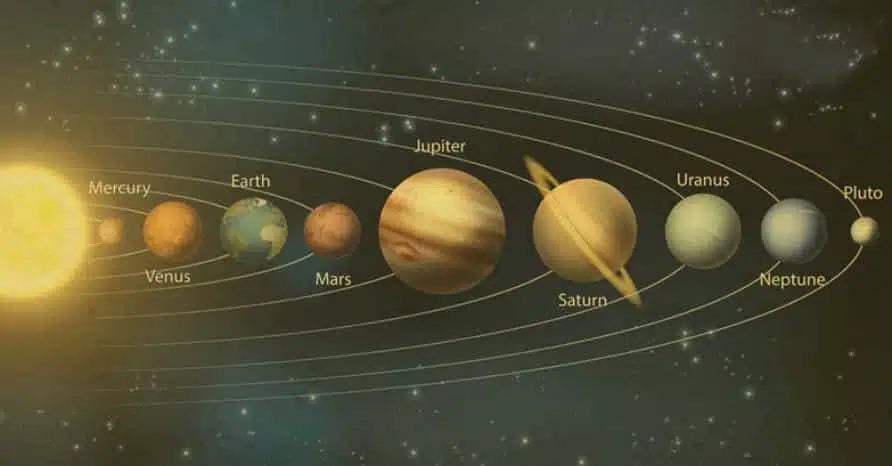
THE MEANING OF THE PLANETS IN ASTROLOGY
Share
In our articles dedicated to zodiac signs , we have always talked about the influence of the planets, as well as the ascendants . But what exactly do we mean when we talk about planets, in the astrological sense?
The planets, in this sense, represent the dimensions of human experience: intelligence, affectivity, emotionality, relationships, energy, courage, intuition, genius, aggressiveness…
We must imagine the planets as large containers of symbols that, based on their position in a person's birth chart, take on different meanings.
A Mercury born under the sign of Cancer, for example, will be very different from one in Leo. Each planet therefore has a specific meaning based on the birth chart. We'll be able to clarify these ideas further in the article.
Generally speaking, astrology considers ten celestial bodies to be planets: the Sun, the Moon, Mercury, Venus, Mars, Jupiter, Saturn, Uranus, Neptune, and Pluto. As you know, in astronomy, the Sun and Moon are certainly not considered planets. Even Pluto, astronomically, is still a hotly debated subject as to whether it is a planet or not.
Let's start by dividing the planets into three groups:
Personal planets: (or fast-moving planets) symbolize the individual's personality: Sun, Moon, Mercury, Venus, Mars.
Social planets: they symbolize the relationship between the individual and society and how the individual fits into the latter: Jupiter, Saturn.
Transpersonal planets: they symbolize generational dynamics. They have very long orbits around the sun, are read primarily in reference to the personal planets, and indicate dynamics of transformation and change.
In the next articles we will dedicate to this topic, we will do a careful analysis of all the planets and report the relationships that each of them has with all the zodiac signs.
Let's start by giving a brief overview of each planet, which will help us better understand how this delicate topic works. Those familiar with Greek mythology will likely find this helpful.
Mercury
Mercury symbolizes intelligence, logic, mental connection with the outside world, perception of the world through knowledge, all means of expression, reason, criticism, calculation, adaptation, development.
Mars
Mars's quality is almost superfluous to emphasize: courage. The god of war emphasizes boldness, but not all signs can be described with the same emphasis on "courage."
Venus
Venus is primarily associated with beauty, pleasure, and the emotional sphere. The ability to love, the ability to love oneself, aesthetics, harmony, and a penchant for artistic pursuits are all characteristics symbolized by this planet.
Jupiter
Jupiter symbolizes confidence in life, ideals, and values. This planet encompasses all the forces of growth that enrich life. It is the planet of maturation, fortune, well-being, and the expansion of one's personal horizons.
Saturn
Saturn symbolizes the basic psychological structure of the individual. It is the planet of morality, responsibility, and important choices. It is a planet that shapes our consciousness through limitations and losses.
Uranus
Uranus symbolizes the ability to make decisions, to change, to pivot, to pursue new paths. It's a planet associated with genius and also with recklessness. Freedom breathes deeply on Uranus.
Neptune
Neptune symbolizes metamorphosis, transcendence, and illusory actions. Our rationality can be influenced and confused by this planet. But Neptune is also the repository of the energy that aids our intuition, creativity, and imagination.
Pluto
Pluto symbolizes power and the unconscious. This planet tells us about our relationship with the magical, esoteric world, with dark forces, with the cycles of death and life... It is a planet full of mystery and also emphasizes our ability to regenerate.
We'll quote a few lines from Wikipedia regarding the entry on astrology, to underscore the importance of this method of knowledge throughout human history. Even though, in the latter part of the last century, attempts were made to reduce this entire ancient tradition to a fairy tale for imbeciles.
«Astra inclined, not necessitant»
«The stars influence, but do not force»
-Thomas Aquinas-
All major ancient civilizations devoted great attention to the observation of celestial phenomena and developed their own astrology. Examples include Babylonian astrology (from which Western astrology derives), Vedic or Indian astrology (still widespread in India today but also a descendant of Babylonian astrology), Chinese astrology (substantially different from Western astrology), and the astrology of the Mayan people of Central America.
Even among primitive peoples, a form of astrology existed, certainly less advanced than that developed among the great civilizations due to their limited mathematical capabilities, essential for defining the movement of the stars. The absence of written sources prevents detailed knowledge of the astrological techniques practiced by the "nature peoples." However, it can be deduced that the main astral reference points were the Sun, the Moon, Venus, and the star Sirius, as well as several constellations (the two Chariots, Orion, and the Pleiades).
In Europe, after a period of decline during the Middle Ages, with the revival of interest in astronomy in the 13th century, astrology was also reborn, so much so that Guido Bonatti, who lived in that era, is considered "the most authoritative astrology treatise writer of the Italian Middle Ages".
Astrology, as a supposed tool for predicting the future, has had strong ties to other divinatory practices throughout the world, particularly palmistry, metoposcopy, and geomancy. At the same time, it has been, and still is, an essential point of reference in magical practices.
